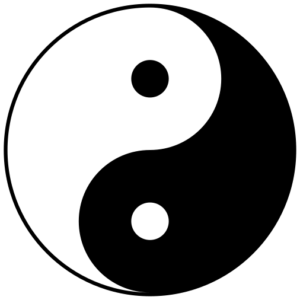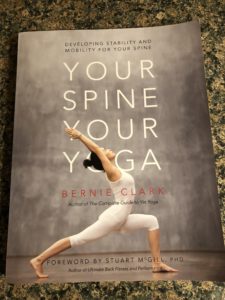Yin and Yang = balance; Attention and Intention leave no stone unturned.
When one considers how long the practice of Yoga has been in existence, my own study might be called neonatal. For fewer years than the fingers on one hand, I have, almost daily, rolled out my Yoga mat and attempted some sort of practice. Like many newbies, I was attracted to the physicality of the poses (Asanas), the flow (I do love a Vinyasa class), and the beauty of the practice itself.
Because it is my habit to do so when learning a new skill, I went straight to the venue of teacher training in order to learn as much as I could of the technique and philosophy. It was the right thing to do. First I studied Yoga for Athletes at Kripalu with Sage Rountree. Then I leapt eagerly into 200 hours of Yoga Teacher Training with Regina Trailweaver at Lotus Yoga in Vermont. After becoming certified, and along the way, having met a teacher who would ultimately become exactly the right teacher for me, I chose to pursue advanced training in the study of Yin Yoga. I am currently working through an additional 300 hours of training with Josh Summers and Terry Cockburn, Summers School of Yin Yoga.
OK, so these are simply dry stats. What these studies are doing for me is beyond explanation or definition. It is truly humbling to realize that teachers before me have continued to study, learn, practice and teach for literally decades and still suggest that they have only begun to scratch the surface of what we call Yoga.
Though there are many forms of Yoga being taught in today’s world (a huge subject for another blog post), there seem to be a few universal truths. First of all, as a student of both Yin and Yang Yoga, I believe it is important to balance our Yoga by practicing both techniques. I now know that Yoga envelopes far more than simply the physical Asanas. In fact, as you may already know, early Yoga practice thousands of years ago was designed to aid meditation and was comprised of one action (or inaction) – sitting for long periods of time. Today, Yoga classes range physically from the proverbial sublime to the ridiculous – though I guess if it works for you, nothing is ridiculous! More and more Yoga students stretch their bodies, minds and emotions mingling bodily attainments with spiritual seeking. Mind and body clearly connect, support and sustain.
Coming to Yoga from a professional personal training and athletic background, I am excited by the relatively recent emphasis on functional alignment. Years ago in the gym, after gleaning far more information about the human body and how it works, we first moved away from traditional training to eagerly embrace the new and exciting approach to training as “functional.” A little later the pendulum swung back to more of an integrated form of training, but the wisdom and pragmatism of functional training stuck.
It appears that Yoga technique may be journeying down the same path. As injuries have stepped into the spotlight, more teachers and practitioners look to making adaptations to strict alignment, which, albeit aesthetically pleasing, might not work for all bodies as all bodies are certainly not the same.
 Bernie Clark, a leader in the field of Yin Yoga, (www.YinYoga.com) has recently published the 2nd of his trilogy of books serving as detailed texts on the science behind the Yoga-practicing body. Clark urges the reader to know why he or she is practicing Yoga. What is your intention? Why are you even stepping on the mat? Whether considering a particular pose or thinking of the practice as a whole, what do we want from our efforts? Are we seeking spiritual enlightenment, a body that could grace the cover of Yoga Journal, increased energy, improved sports performance, or maybe physical health and well-being coupled with mental and emotional balance and stability? Will we even recognize it if we begin to reach steps towards achieving our goals – that is, if we have defined them?
Bernie Clark, a leader in the field of Yin Yoga, (www.YinYoga.com) has recently published the 2nd of his trilogy of books serving as detailed texts on the science behind the Yoga-practicing body. Clark urges the reader to know why he or she is practicing Yoga. What is your intention? Why are you even stepping on the mat? Whether considering a particular pose or thinking of the practice as a whole, what do we want from our efforts? Are we seeking spiritual enlightenment, a body that could grace the cover of Yoga Journal, increased energy, improved sports performance, or maybe physical health and well-being coupled with mental and emotional balance and stability? Will we even recognize it if we begin to reach steps towards achieving our goals – that is, if we have defined them?
Clark puts it this way: “One of the great gifts of yoga is the ability to attend–to notice what is happening right here, right now, in your body, in your heart and in your mind. By paying attention and comparing what is arising with what you intend to arise, you can make a skillful, conscious choice to either accept what is or change it, based on whether or not what is arising is helping you achieve your intention.” (Your Spine Your Yoga, Bernie Clark, Wild Strawberry Productions, 2018)
Yin and Yang = balance. Intention and Attention leave no stone unturned. Teachers who teach best are eternal students. Students who question approach learning with healthy curiosity, receptivity and the daring to taste and test change.
Many years ago as a student at Johns Hopkins University I was both horrified and fascinated by graffiti found on a brick wall on the Homewood campus: QUESTION AUTHORITY! I was, and somewhat still am, a rule-follower. Yet the memory of those two words continues to affect my thinking. Theory should work. Practice is its proof. In Vermont we like to say, “If it ain’t broke, don’t fix it.” Perhaps another take on this would be, “If it ain’t working, fix it!”
Question. Test. Adapt.
Walk into a Yoga studio. Step onto your mat. Begin your practice. Notice. Notice how you feel and what you feel. Notice the room in which you practice and the bodies around you, each beginning his or her own uniquely individual practice. Notice the connection you invariably feel with those in close physical proximity and with those who you instinctively know you have connected mentally and emotionally. Notice that spirituality is a living, almost palpable thing, an integral part of your practice. Attend.
A friend suggested that I go to www.Tricycle.org and sign up for Daily Dharma.
Here’s one you might like: “Grace provides the framework within which a meaningful life is lived. Love is the substance of it day to day. To live a spiritual life, then, is essentially to do things ‘for the love of it’-to do things without attachment to a result or reward.” Dharmavidya David Brazier.
May we all practice Yoga ‘for the love of it,’ safely, effectively, profoundly, physically and spiritually. Yin and Yang = balance. Intention and Attention leave no stone unturned. Question authority. Do all, receiving and sharing Grace. Namaste.
